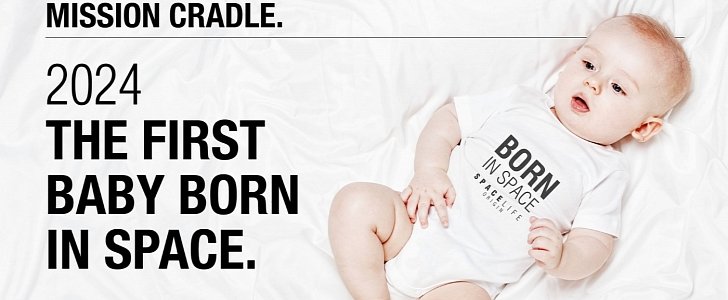A Dutch startup is aiming for the stars – and causing a controversy in the process. SpaceLife Origin recently announced plans to put a pregnant woman in orbit and have her give birth there, before bringing her and the child back to earth.
Mark your calendars for 2024, because that’s when the mission will take place, according to a statement on the official page of the startup. Businessman Egbert Edelbroek, who is also one of the founders of SpaceLife Origin, concedes that there are still many unknowns to the equation, but he is convinced they will be able to work them out by the time of the launch.
He tells The Atlantic that the insurance policy for the survival of the human race lies with learning how to reproduce and give birth in space. When our planet has died and humanity will look to other planets for relocation, we will have to have mastered the skill of birthing babies in zero gravity. Or so he believes.
“Human settlements outside of Earth would be pretty pointless without learning how to reproduce in space,” Edelbroek explains.
To that end, SpaceLife is working with experts and potential future space mothers to make it happen. He says he’s already spoken to various investors and space flight companies, to secure funding for the mission and a rocket. He estimates the mission would last between 24 and 36 hours, timing the start of the contractions with the launch and ending with the mother and kid’s return to Earth.
Neither Edelbroek nor anyone else involved in the project can say what would happen with the mother and her unborn baby during the rocket launch, when the force of gravity experienced by astronauts triples. Neither can they say how the free fall through the atmosphere would affect the body of a woman who has just given birth or her newborn child.
And these are just a couple of issues such a mission would have to address before takeoff. There’s also the question of whether sending a woman in space at her most vulnerable time is ethical, or of the nationality of a child born in space, to name just a couple more.
But at least SpaceLife is honest about it: if they don’t do it, someone else will, more or less openly.
“I think at some point this will happen anyway, so we better do it in a very open and transparent manner. If it’s somebody working on his own, in isolation, not in contact with the rest of the world, you may discover that something happens and you can’t reverse it,” Gerrit-Jan Zwenne, one of SpaceLife Origin’s advisers, says for the same media outlet.
He tells The Atlantic that the insurance policy for the survival of the human race lies with learning how to reproduce and give birth in space. When our planet has died and humanity will look to other planets for relocation, we will have to have mastered the skill of birthing babies in zero gravity. Or so he believes.
“Human settlements outside of Earth would be pretty pointless without learning how to reproduce in space,” Edelbroek explains.
To that end, SpaceLife is working with experts and potential future space mothers to make it happen. He says he’s already spoken to various investors and space flight companies, to secure funding for the mission and a rocket. He estimates the mission would last between 24 and 36 hours, timing the start of the contractions with the launch and ending with the mother and kid’s return to Earth.
Neither Edelbroek nor anyone else involved in the project can say what would happen with the mother and her unborn baby during the rocket launch, when the force of gravity experienced by astronauts triples. Neither can they say how the free fall through the atmosphere would affect the body of a woman who has just given birth or her newborn child.
And these are just a couple of issues such a mission would have to address before takeoff. There’s also the question of whether sending a woman in space at her most vulnerable time is ethical, or of the nationality of a child born in space, to name just a couple more.
But at least SpaceLife is honest about it: if they don’t do it, someone else will, more or less openly.
“I think at some point this will happen anyway, so we better do it in a very open and transparent manner. If it’s somebody working on his own, in isolation, not in contact with the rest of the world, you may discover that something happens and you can’t reverse it,” Gerrit-Jan Zwenne, one of SpaceLife Origin’s advisers, says for the same media outlet.









